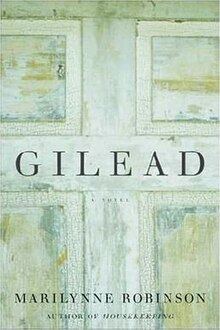Gilead (novel)

Cover of the first edition
|
|
| Author | Marilynne Robinson |
|---|---|
| Country | United States |
| Language | English |
| Genre | Novel |
| Publisher | Farrar, Straus and Giroux |
|
Publication date
|
November 4, 2004 |
| Media type | hardcover, paperback, audiobook |
| Pages | 256 pp. |
| ISBN | |
| OCLC | 54881929 |
| 813/.54 22 | |
| LC Class | PS3568.O3125 G55 2004 |
| Followed by | Home |
Gilead is a novel written by Marilynne Robinson that was published in 2004. Gilead won the 2005 Pulitzer Prize for Fiction, as well as the National Book Critics Circle Award. It is her second novel, following Housekeeping, which was published in 1980. Gilead is an epistolary novel that is the fictional autobiography of the Reverend John Ames, an elderly congregationalist pastor in the small, secluded town of Gilead, Iowa, who knows that he is dying of a heart condition. At the beginning of the book, the date is established as 1956, and Ames explains that he is writing an account of his life for his seven-year-old son, who will have few memories of him.
The book is an account of the memories and legacy of John Ames as he remembers his experiences of his father and grandfather to share with his son. All three men share a vocational lifestyle and profession as Congregationalist ministers in Gilead, Iowa. John Ames describes his vocation as "giving you a good basic sense of what is being asked of you and also what you might as well ignore", explaining that your vocation is something both hard to fulfill and hard to obtain. He writes that this is one of the most important pieces of wisdom he can bestow to his son. Ames's father was a Christian pacifist, but his grandfather was a radical abolitionist who carried out guerrilla actions with John Brown before the American Civil War, served as a chaplain with the Union forces in that war, and incited his congregation to join up and serve in it; as Ames remarks, his grandfather "preached his people into the war." The grandfather returned from the war maimed with the loss of his right eye. Thereafter he was given the distinction that his right side was holy or sacred in some way, that it was his link to commune with God, and he was notorious for a piercing stare with the one eye he had left.
...
Wikipedia
